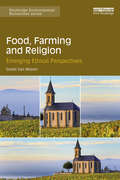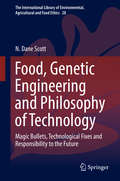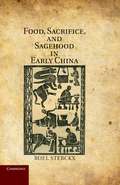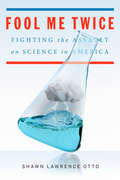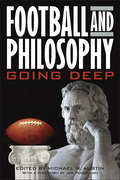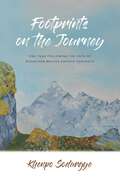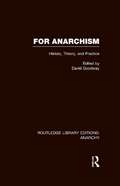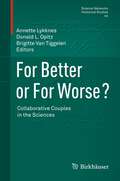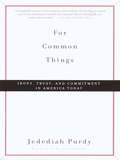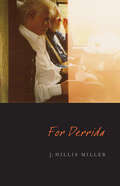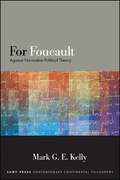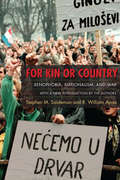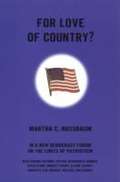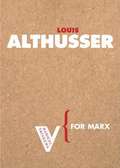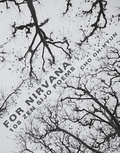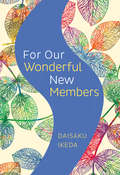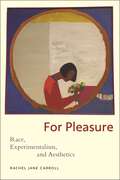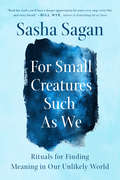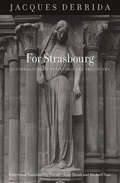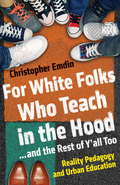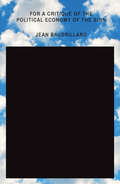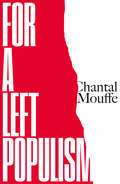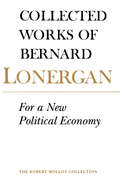- Table View
- List View
Food, Farming and Religion: Emerging Ethical Perspectives (Routledge Environmental Humanities)
by Gretel Van WierenAlthough the religious and ethical consideration of food and eating is not a new phenomenon, the debate about food and eating today is distinctly different from most of what has preceded it in the history of Western culture. Yet the field of environmental ethics, especially religious approaches to environmental ethics, has been slow to see food and agriculture as topics worthy of analysis. This book examines how religious traditions and communities in the United States and beyond are responding to critical environmental ethical issues posed by the global food system. In particular, it looks at the responses that have developed within Jewish, Christian, and Islamic traditions, and shows how they relate to arguments and approaches in the broader study of food and environmental ethics. It considers topics such as land degradation and restoration, genetically modified organisms and seed consolidation, animal welfare, water use, access, pollution, and climate, and weaves consideration of human wellbeing and justice throughout. In doing so, Gretel Van Wieren proposes a model for conceptualizing agricultural and food practices in sacred terms. This book will appeal to a wide and interdisciplinary audience including those interested in environment and sustainability, food studies, ethics, and religion.
Food, Genetic Engineering and Philosophy of Technology: Magic Bullets, Technological Fixes and Responsibility to the Future (The International Library of Environmental, Agricultural and Food Ethics #28)
by N. Dane ScottThis book describes specific, well-know controversies in the genetic modification debate and connects them to deeper philosophical issues in philosophy of technology. It contributes to the current, far-reaching deliberations about the future of food, agriculture and society. Controversies over so-called Genetically Modified Organisms (GMOs) regularly appear in the press. The biotechnology debate has settled into a long-term philosophical dispute. The discussion goes much deeper than the initial empirical questions about whether or not GM food and crops are safe for human consumption or pose environmental harms that dominated news reports. In fact, the implications of this debate extend beyond the sphere of food and agriculture to encompass the general role of science and technology in society. The GM controversy provides an occasion to explore important issues in philosophy of technology. Researchers, teachers and students interested in agricultural biotechnology, philosophy of technology and the future of food and agriculture will find this exploration timely and thought provoking.
Food, Sacrifice, and Sagehood in Early China
by Roel SterckxIn ancient China, the preparation of food and the offering up of food as a religious sacrifice were intimately connected with models of sagehood and ideas of self-cultivation and morality. Drawing on received and newly excavated written sources, Roel Sterckx's book explores how this vibrant culture influenced the ways in which the early Chinese explained the workings of the human senses, and the role of sensory experience in communicating with the spirit world. The book, which begins with a survey of dietary culture from the Zhou to the Han, offers intriguing insights into the ritual preparation of food - some butchers and cooks were highly regarded and would rise to positions of influence as a result of their culinary skills - and the sacrificial ceremony itself. As a major contribution to the study of early China and to the development of philosophical thought, the book will be essential reading for students of the period, and for anyone interested in ritual and religion in the ancient world.
Fool Me Twice: Fighting the Assault on Science in America
by Shawn Lawrence Otto"Whenever the people are well informed," Thomas Jefferson wrote, "they can be trusted with their own government."But what happens in a world dominated by complex science? Are the people still well-enough informed to be trusted with their own government? And with less than 2 percent of Congress with any professional background in science, how can our government be trusted to lead us in the right direction?Will the media save us? Don't count on it. In early 2008, of the 2,975 questions asked the candidates for president just six mentioned the words "global warming" or "climate change," the greatest policy challenge facing America. To put that in perspective, three questions mentioned UFOs.Today the world's major unsolved challenges all revolve around science. By the 2012 election cycle, at a time when science is influencing every aspect of modern life, antiscience views from climate-change denial to creationism to vaccine refusal have become mainstream.Faced with the daunting challenges of an environment under siege, an exploding population, a falling economy and an education system slipping behind, our elected leaders are hard at work ... passing resolutions that say climate change is not real and astrology can control the weather.Shawn Lawrence Otto has written a behind-the-scenes look at how the government, our politics, and the media prevent us from finding the real solutions we need. Fool Me Twice is the clever, outraged, and frightening account of America's relationship with science—a relationship that is on the rocks at the very time we need it most.
Football and Philosophy: Going Deep (The Philosophy of Popular Culture)
by Michael W. Austin&“Vince Lombardi—who relished his undergraduate studies in philosophy—would have loved this book.&” —Booklist Football and Philosophy: Going Deep investigates many of the issues surrounding the nation&’s biggest sport. From a review of the flaws of the Bowl Championship Series, to a study of the violence inherent in the game, to an examination of Vince Lombardi&’s views on winning, to the problems created by the development of instant replay, the essays in this collection tackle the moral and philosophical principles behind gridiron competition. The result is an insightful, humorous, and original book that will engage all fans of the game. &“Insightful and informative, as well as provocative and entertaining.&” —Charles Taliaferro, author of Consciousness and the Mind of God
Footprints on the Journey: One Year Following the Path of Dzogchen Master Khenpo Sodargye
by Khenpo SodargyeInspiring diary entries from a challenging year in the life of the renowned Dzogchen master Khenpo Sodargye demonstrate right conduct for the path to liberation.This personal diary that the renowned Dzogchen master Khenpo Sodargye kept for one year gives serious Dharma practitioners a lifetime of inspiring, wise guidance for practicing right conduct on the path. The backdrop is the Tibetan plateau, from which Khenpo invites us to see the world—from native people to a spider, from vast galaxies to a water droplet—as he does, with candor and humor, and with a Dzogchen master&’s sharp analysis. He shares with us his perceptions of this world, describing his ups and downs in a way that we can relate to and be inspired by, even if we do not have the fortitude to stand up to the oppression of crustaceans or to ransom yaks from the slaughterhouse. Spontaneous and lively, the entries play out the vicissitudes of his life throughout a challenging year, tracking the passage of his thoughts and actions, leaving footprints for whoever is able to follow.
For Anarchism: History Theory And Practice (Routledge Library Editions: Anarchy)
by David GoodwayThis collection discusses both the history and theory of anarchism and in particular examines italian anarchism, the relationship between Marxism and anarchism, the influence of Kropotkin, new social movements and the anarchist theory of history.
For Better or For Worse? Collaborative Couples in the Sciences
by Annette Lykknes Donald L. Opitz Brigitte Van TiggelenIn this volume, a distinguished set of international scholars examine the nature of collaboration between life partners in the sciences, with particular attention to the ways in which personal and professional dynamics can foster or inhibit scientific practice. Breaking from traditional gender analyses which focus on divisions of labor and the assignment of credit, the studies scrutinize collaboration as a variable process between partners living in the nineteenth and twentieth centuries who were married and divorced, heterosexual and homosexual, aristocratic and working-class and politically right and left. The contributors analyze cases shaped by their particular geographical locations, ranging from retreat settings like the English countryside and Woods Hole, Massachusetts, to university laboratories and urban centers in Berlin, Stockholm, Geneva and London. The volume demonstrates how the terms and meanings of collaboration, variably shaped by disciplinary imperatives, cultural mores, and the agency of the collaborators themselves, illuminate critical intellectual and institutional developments in the modern sciences.
For Common Things: Irony, Trust, and Commitment in America Today
by Jedediah PurdyJedediah Purdy calls For Common Things his "letter of love for the world's possibilities." Indeed, these pages--which have already garnered a flurry of attention among readers and in the media--constitute a passionate and persuasive testament to the value of political, social, and community reengagement. Drawing on a wide range of literary and cultural influences--from the writings of Montaigne and Thoreau to the recent popularity of empty entertainment and breathless chroniclers of the technological age--Purdy raises potent questions about our stewardship of civic values.Most important, Purdy offers us an engaging, honest, and bracing reminder of what is crucial to the healing and betterment of society, and impels us to consider all that we hold in common.From the Trade Paperback edition.
For Derrida
by J. Hillis MillerThis book—the culmination of forty years of friendship between J. Hillis Miller and Jacques Derrida, during which Miller also closely followed all Derrida’s writings and seminars—is “for Derrida” in two senses. It is “for him,” dedicated to his memory. The chapters also speak, in acts of reading, as advocates for Derrida’s work. They focus especially on Derrida’s late work, including passages from the last, as yet unpublished, seminars. The chapters are “partial to Derrida,” on his side, taking his part, gratefully submitting themselves to the demand made by Derrida’s writings to be read—slowly, carefully, faithfully, with close attention to semantic detail.The chapters do not progress forward to tell a sequential story. They are, rather, a series of perspectives on the heterogeneity of Derrida’s work, or forays into that heterogeneity.The chief goal has been, to borrow a phrase from Wallace Stevens, “plainly to propound” what Derrida says. The book aims, above all, to render Derrida’s writings justice. It should be remembered, however, that, according to Derrida himself, every rendering of justice is also a transformative interpretation. A book like this one is not a substitute for reading Derrida for oneself. It is to be hoped that it will encourage readers to do just that.
For Foucault: Against Normative Political Theory (SUNY series in Contemporary Continental Philosophy)
by Mark G. KellyThis book comprises a series of staged confrontations between the thought of Michel Foucault and a cast of other figures in European and Anglophone political philosophy, including Marx, Lenin, Althusser, Deleuze, Rorty, Honneth, and Geuss. Focusing on the status of normativity in their thought, Mark G. E. Kelly explains how Foucault's position in relation to political theory is different, and, over the course of the book, describes a distinctive Foucauldian stance in political thought that is maximally anti-normative, anti-theoretical, and anti-political. For Foucault aims to undermine attempts to discern the appropriate form of political action, instead putting forward a rigorously critical program for a political theory that lacks any moralizing or totalizing dimension, and serves only to side with resistance against power, and never with power itself. Looking at attempts to think radically about politics from Marx to the present day, Kelly traces a novel history of political thought as a trend of attempts to overcome the constraints of normativity, theoreticism, and subordination to public policy. He concludes by assessing and rejecting recent attempts to reclaim Foucault for a form of normative politics by associating him with neoliberalism.
For Kin or Country
by R. William Ayres Stephen M. SaidemanThe collapse of an empire can result in the division of families and the redrawing of geographical boundaries. New leaders promise the return of people and territories that may have been lost in the past, often advocating aggressive foreign policies that can result in costly and devastating wars. The final years of the Austro-Hungarian and Ottoman empires, the end of European colonization in Africa and Asia, and the demise of the Soviet Union were all accompanied by war and atrocity.These efforts to reunite lost kin are known as irredentism ? territorial claims based on shared ethnic ties made by one state to a minority population residing within another state. For Kin or Country explores this phenomenon, investigating why the collapse of communism prompted more violence in some instances and less violence in others. Despite the tremendous political and economic difficulties facing all former communist states during their transition to a market democracy, only Armenia, Croatia, and Serbia tried to upset existing boundaries. Hungary, Romania, and Russia practiced much more restraint.The authors examine various explanations for the causes of irredentism and for the pursuit of less antagonistic policies, including the efforts by Western Europe to tame Eastern Europe. Ultimately, the authors find that internal forces drive irredentist policy even at the risk of a country's self-destruction and that xenophobia may have actually worked to stabilize many postcommunist states in Eastern Europe.
For Kin or Country: Xenophobia, Nationalism, and War
by Stephen M. Saideman R. William AyresFor Kin or Country investigates why the collapse of communism prompted more violence in some instances and less violence in others.
For Kin or Country: Xenophobia, Nationalism, and War
by R. William Ayres Stephen SaidemanThe collapse of an empire can result in the division of families and the redrawing of geographical boundaries. New leaders promise the return of people and territories that may have been lost in the past, often advocating aggressive foreign policies that can result in costly and devastating wars. The final years of the Austro-Hungarian and Ottoman empires, the end of European colonization in Africa and Asia, and the demise of the Soviet Union were all accompanied by war and atrocity.These efforts to reunite lost kin are known as irredentism—territorial claims based on shared ethnic ties made by one state to a minority population residing within another state. For Kin or Country explores this phenomenon, investigating why the collapse of communism prompted more violence in some instances and less violence in others. Despite the tremendous political and economic difficulties facing all former communist states during their transition to a market democracy, only Armenia, Croatia, and Serbia tried to upset existing boundaries. Hungary, Romania, and Russia practiced much more restraint. The authors examine various explanations for the causes of irredentism and for the pursuit of less antagonistic policies, including the efforts by Western Europe to tame Eastern Europe. Ultimately, the authors find that internal forces drive irredentist policy even at the risk of a country's self-destruction and that xenophobia may have actually worked to stabilize many postcommunist states in Eastern Europe.Events in Russia and Eastern Europe in 2014 have again brought irredentism into the headlines. In a new Introduction, the authors address some of the events and dynamics that have developed since the original version of the book was published. By focusing on how nationalist identity interact with the interests of politicians, For Kin or Country explains why some states engage in aggressive irredentism and when others forgo those opportunities that is as relevant to Russia and Ukraine in 2014 as it was for Serbia, Croatia, and Armenia in the 1990s.
For Love of Country? A New Democracy Forum on the Limits of Patriotism
by Martha C. Nussbaum Joshua CohenAfter the terrorist attacks on the Pentagon and the World Trade Center, American flags appeared everywhere. Is patriotism a good response at a time of national crisis? What does it mean for us to think of ourselves as a nation first?<P><P> With our connections to the world growing stronger and more vital than ever, Martha C. Nussbaum argues that we should distrust conventional patriotism as parochial and instead see ourselves first of all as "citizens of the world." Sixteen prominent writers and thinkers respond, including Benjamin R. Barber, Sissela Bok, Nathan Glazer, Robert Pinsky, Elaine Scarry, Amartya Sen, and Michael Walzer.
For Marx (Radical Thinkers)
by Louis Althusser Ben BrewsterThis is the work in which Louis Althusser formulated some of his most influential ideas For Marx, first published in France in 1968, has come to be regarded as the founding text of the school of "structuralist Marxism" which was presided over by the fascinating and enigmatic figure of Louis Althusser. Structuralism constituted an intellectual revolution in the 1960s and 1970s and radically transformed the way philosophy, political and social theory, history, science, and aesthetics were discussed and thought about. For Marx was a key contribution to that process and it fundamentally recast the way in which many people understood Marx and Marxism. This book contains the classic statements of Althusser's analysis of the young Marx and the importance of Feuerbach during this formative period, of his thesis of the "epistomological break" between the early and the late Marx, and of his conception of dialectics, contradiction and "overdetermination. " Also included is a study of the materialist theater of Bertolazzi and Brecht and the critique of humanist readings of Marxism. Since his death in 1990, Althusser's legacy has come under renewed examination and it is increasingly recognized that the influence of his ideas has been wider and deeper than previously thought: reading For Marx, in its audacity, originality and rigor, will explain why this impact was so significant.
For Nirvana: 108 Zen Sijo Poems
by Oh-Hyun ChoFor Nirvana features exceptional examples of the poet Cho Oh-Hyun's award-winning work. Cho Oh-Hyun was born in Miryang, South Gyeongsang Province, Korea, and has lived in retreat in the mountains since becoming a novice monk at the age of seven. Writing under the Buddhist name Musan, he has composed hundreds of poems in seclusion, many in the sijo style, a relatively fixed syllabic poetic form similar to Japanese haiku and tanka. For Nirvana contains 108 Zen sijo poems (108 representing the number of klesas, or "defilements," that one must overcome to attain enlightenment). These transfixing works play with traditional religious and metaphysical themes and include a number of "story" sijo, a longer, more personal style that is one of Cho Oh-Hyun's major innovations. Kwon Youngmin, a leading scholar of sijo, provides a contextualizing introduction, and in his afterword, Heinz Insu Fenkl reflects on the unique challenges of translating the collection.
For Our Wonderful New Members
by Daisaku Ikeda"I intend to write as if we were seated together in a shady grove cooled by gentle breezes, engaging in a relaxed conversation." So saying, Daisaku Ikeda invites us to explore with him five core principles of Nichiren Buddhism and the Soka Gakkai movement, so that we may find true happiness ourselves, help others do the same, and bring about a more peaceful world.
For Pleasure: Race, Experimentalism, and Aesthetics (Minoritarian Aesthetics)
by Rachel Jane CarrollArgues that aesthetic pleasure plays a key role in both racial practices and struggles against racistdominationFor Pleasure proposes that experimental aesthetics shaped race in the twentieth-century United Statesby creating transformative scenes of pleasure. Rachel Jane Carroll explains how aesthetic pleasure isfundamental to the production and circulation of racial meaning in the United States through a study ofexperimental work by authors and artists of color.For Pleasure offers methods for reading experimental literature and art produced by racially minoritizedauthors and artists working in and around the US, including Isaac Julien, Nella Larsen, Yoko Ono, JackWhitten, Byron Kim, Glenn Ligon, Zora Neale Hurston, Theresa Hak Kyung Cha, and Cici Wu. Along theway, we learn what a racist joke has to do with the history of monochrome painting, if beauty has a partto play in social change, and whether whimsy should be taken seriously as a political affect. Carrolldraws attention to key connections between aesthetic pleasure and experimentation through theirshared capacity for world-building. Neither aesthetic pleasure nor experimental forms are liberatory inand of themselves; however, both can interrupt, defamiliarize, and rearrange our habits of aestheticjudgment.
For Small Creatures Such as We: Rituals for Finding Meaning in Our Unlikely World
by Sasha Sagan"What is the meaning of life? Sagan finds its meaning everywhere--with her family, around the world, and especially among the stars of the cosmos. Read her work; you'll have a deeper appreciation for your every step, every bite, and every breath." --Bill NyePart memoir, part guidebook, and part social history, For Small Creatures Such as We is the first book from the daughter of Carl Sagan and Ann Druyan--a luminous exploration of Earth's marvels that require no faith in order to be believed.Sasha Sagan was raised by secular parents, the astronomer Carl Sagan and the writer and producer Ann Druyan. They taught her that the natural world and vast cosmos are full of profound beauty, that science reveals truths more wondrous than any myth or fable. When Sagan herself became a mother, she began her own hunt for the natural phenomena behind our most treasured occasions--from births to deaths, holidays to weddings, anniversaries, and more--growing these roots into a new set of rituals for her young daughter that honor the joy and significance of each experience without relying on religious framework.As Sagan shares these rituals, For Small Creatures Such as We becomes a moving tribute to a father, a newborn daughter, a marriage, and the natural world--a celebration of life itself, and the power of our families and beliefs to bring us together.
For Strasbourg: Conversations of Friendship and Philosophy
by Jacques DerridaThe eminent philosopher pays homage to his beloved French city and the philosophical friendships he had there—&“an illuminating addition to his legacy&” (The Times Literary Supplement). A towering figure in twentieth-century philosophy, Jacques Derrida was born in Algeria, but spent four decades living in the French city of Strasbourg, located on the border between France and Germany. This moving collection of writings and interviews about his life there opens with &“The Place Name(s): Strasbourg,&” an essay written just a month before his death which recounts his deep attachment to his adoptive home. More than just a personal narrative, however, the essay is a profound interrogation of the relationship between philosophy and place, philosophy and language, and philosophy and friendship. As such, it raises a series of philosophical, political, and ethical questions that might all be placed under the aegis of what Derrida once called &“philosophical nationalities and nationalism.&” Also included are transcribed conversations between Derrida and his two principal interlocutors in Strasbourg, Jean-Luc Nancy and Philippe Lacoue-Labarthe. These interviews are significant for the themes they focus on—from language and politics to friendship and life after death—and for what they reveal about Derrida&’s relationships to Nancy and Lacoue-Labarthe. Filled with sharp insights into one another&’s work and peppered with personal anecdotes and humor, the interviews bear witness to the long intellectual friendships of these three important thinkers.
For White Folks Who Teach in the Hood ... and the Rest of Y'all Too: Reality Pedagogy and Urban Education
by Christopher Emdin<P>Merging real stories with theory, research, and practice, a prominent scholar offers a new approach to teaching and learning for every stakeholder in urban education. <P>Drawing on his own experience of feeling undervalued and invisible in classrooms as a young man of color and merging his experiences with more than a decade of teaching and researching in urban America, award-winning educator Christopher Emdin offers a new lens on an approach to teaching and learning in urban schools. <P>He begins by taking to task the perception of urban youth of color as unteachable, and he challenges educators to embrace and respect each student's culture and to reimagine the classroom as a site where roles are reversed and students become the experts in their own learning. <P>Putting forth his theory of Reality Pedagogy, Emdin provides practical tools to unleash the brilliance and eagerness of youth and educators alike--both of whom have been typecast and stymied by outdated modes of thinking about urban education. <P>With this fresh and engaging new pedagogical vision, Emdin demonstrates the importance of creating a family structure and building communities within the classroom, using culturally relevant strategies like hip-hop music and call-and-response, and connecting the experiences of urban youth to indigenous populations globally. <P>Merging real stories with theory, research, and practice, Emdin demonstrates how by implementing the "Seven C's" of reality pedagogy in their own classrooms, urban youth of color benefit from truly transformative education. <P>Lively, accessible, and revelatory, For White Folks Who Teach in the Hood. . . and the Rest of Y'all Too is the much-needed antidote to traditional top-down pedagogy and promises to radically reframe the landscape of urban education for the better.
For a Critique of the Political Economy of the Sign
by Jean BaudrillardA material analysis of the sign which deepens Marx's critique of political economy for spectacular times.What if the problems of modern society don't come from production, but rather consumption and the system of cultural signs? In this classic work from the defining intellectual of the postmodern, Jean Baudrillard, For a Critique of the Political Economy of the Sign takes Marx's critique of political economy and its analysis of the commodity form as the starting point for an analysis of signs and their meaning in modern society. Influenced by Lefebvre's critique of everyday life, Barthes's semiology, and Situationism, Baudrillard analyses how objects are encoded within the system of signs and meanings that constitute contemporary media and consumer societies. Combining semiological studies and sociology of the consumer society, For a Critique of the Political Economy of the Sign contains Baudrillard's most extensive engagement with Marxism and shows him at a critical juncture for the development of his thought.
For a Left Populism
by Chantal MouffeWhat is the "populist moment" and what does it mean for the left?Populism, today, is the expression of a crisis of liberal-democratic politics. It is more than an ideology or a political regime. It is a way of doing politics that can take various forms but emerges when one aims at building a new subject of collective action--the people.In this new book the leading political thinker Chantal Mouffe proposes a new way to define left populism. The political is to be constructed by establishing a political frontier that divides society into two camps, mobilising an "underdog" against "those in power". Populism, far from being a perversion of democracy, constitutes the most adequate political force to recover and reconstitute itself. This new politics must recognise its partisan character. This presents itself as more than the image of demagoguery and emotive rabbles seen across our media. Furthermore, it is an urgent struggle, because the future will be formed by the kind of populism that emerges victorious from the conflict against the current threats of post-politics and post-democracy.
For a New Political Economy: Volume 21
by Bernard Lonergan Philip McshaneBernard Lonergan's economic writings span forty years and represent one of the most important intellectual achievements of the twentieth century. Unfortunately they have been inaccessible outside of the Lonergan research community as the majority of them have not been formally published, and exist only as a group of unfinished essays and material for courses on economics taught by Lonergan. The publication of For a New Political Economy, along with its companion volume, Macroeconomic Dynamics: An Essay in Circulation Analysis (Collected Works of Bernard Lonergan, Volume 15), seeks to remedy this by bringing together the various elements of Lonergan's economic thought. Lonergan's concept of economics differs radically from that of contemporary economists and represent a major paradigm shift. He takes a fresh look at fundamental variables and breaks from centralist theory and practice, offering a uniquely democratic perspective on surplus income and non-political control. For a New Political Economy is a collection of drafts, notes, and essays written by Lonergan in the 1940s on various aspects of economics. This volume provides the intellectual underpinnings of ideas more fully explored in Macroeconomic Dynamics.
